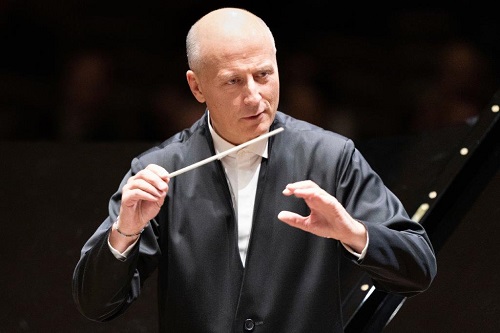 Switzerland Messaien, Beethoven: Arcadi Volodos (piano), Tonhalle Orchestra Zurich/Paavo Järvi (conductor), Tonhalle Maag, Zurich, 11.4.2019. (JR)
Switzerland Messaien, Beethoven: Arcadi Volodos (piano), Tonhalle Orchestra Zurich/Paavo Järvi (conductor), Tonhalle Maag, Zurich, 11.4.2019. (JR)

Messaien – L’Ascension
Beethoven – Piano Concerto No.3 Op.37; Symphony No.4 Op.60
Many music-lovers will know Messaien’s Turangalîla Symphony (people tend to either love the work or hate it) and will be aware too that he used bird song in a number of later works; this concert provided a chance to get to know a much lesser-known early work, and one that put Messaien firmly on the map as a major 20th–century composer.
Messaien composed L’Ascension at the age of 24, in 1932. It is a surprisingly mature, sophisticated work and Messaien’s unique sound world is already clearly audible. The work is in four sections, all with religious subtitles alluding to Christ’s admiration for his father or hallelujahs for souls searching for Heaven. The first section is for brass alone, a long magnificent chorale which has its technical challenges for the trumpet section, very well mastered by principals Philippe Litzler and Heinz Saurer. The second movement is given over to the massed woodwind, particularly the cor anglais (marvellously played by Martin Frutiger) with its plangent theme, and then Messaien adds whirring strings. The third movement brings some levity, Messaien adding percussion, cymbals and tambourine. Finally, in the last movement, a string lament. Orchestral colours shimmer throughout; I was much taken by the work, and so was the rest of the audience. It was recorded for release in October, together with other early Messaien works (Les Offrandes Oubliées, Le tombeau resplendissant, and Un sourire).
I must admit my heart does not exactly leap at the thought of yet another performance of a Beethoven piano concerto but it undoubtedly helps to fill the hall, and I was therefore more than happy that it received a tremendous performance at the hands of Arcadi Volodos. No piano stool for him, just an ordinary chair so he could sit back before his first entry and later during the concerto, whenever the music allowed. He looked totally relaxed throughout and that fed into the entire performance. His touch could be weighty or light, even tender (surprisingly, he is a big man); no hurdles for him technically, it all seemed effortless. During the cadenzas (Beethoven’s) you could have heard a pin drop. The audience and orchestra gave him a rapturous reception which clearly moved him. He was ably aided with very crisp accompaniment by Paavo Järvi, who chose historically correct antiphonal seating for the strings; he placed the double basses behind the first violins, and the horns behind the violas. Timpanist Christian Hartmann used period timpani for the Beethoven works, which required constant re-tuning (which only went awry once) and the hard sticks made their impressive presence felt.
After the interval, Beethoven’s delightful Fourth Symphony. Järvi has recorded all the symphonies with the Deutsche Kammerphilharmonie Bremen a few years ago, to very good critical reviews. Järvi tries hard to observe Beethoven’s metronome markings, which are often horrendously fast. The opening of the last movement was taken at quite an astonishing pace. The Tonhalle Orchestra manages to keep up – just. The performance is not historically correct, as the Tonhalle Orchestra uses modern instruments but the period timpani gave the performance a historic flavour. This was an effervescent performance, full of verve, and the audience lapped it up. It was noticeable how often the players smiled to each other and with the conductor, surely a sign of great harmony to come under their incoming Chief Conductor.
Järvi will open the new season, his first as Chief Conductor, with Sibelius Kullervo; we can then expect a complete Tchaikovsky cycle (to be recorded for release in summer 2020); a semi-staged performance of Fidelio (next year, it is the 250th anniversary of Beethoven’s birth – Järvi, probably wisely, decided to leave a cycle of his symphonies to other orchestras); and, for Nielsen lovers, his rarely heard Second Symphony. Estonian composer and former rock star Erkki-Sven Tüür (with whom Järvi went to school) will be the Orchestra’s Creative Chair next season.
John Rhodes